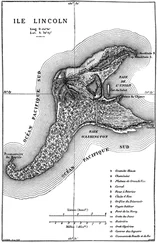| Jules Verne |
Жюль Верн |
| The Mysterious Island |
Таинственный остров |
| PART 1-DROPPED FROM THE CLOUDS |
ЧАСТЬ ПЕРВАЯ ПОТЕРПЕВШИЕ КРУШЕНИЕ |
| Chapter 1 |
ГЛАВА I |
| "Are we rising again?" |
- Мы поднимаемся? |
| "No. |
- Нет! |
| On the contrary." |
Напротив! |
| "Are we descending?" |
Мы опускаемся! |
| "Worse than that, captain! we are falling!" |
- Хуже того, мистер Сайрес: мы падаем! |
| "For Heaven's sake heave out the ballast!" |
- Выбросить балласт! |
| "There! the last sack is empty!" |
- Последний мешок только что опорожнен! |
| "Does the balloon rise?" |
- Поднимается ли шар? |
| "No!" |
- Нет! |
| "I hear a noise like the dashing of waves. |
- Я как будто слышу плеск волн! |
| The sea is below the car! |
- Корзина - над водой! |
| It cannot be more than 500 feet from us!" |
- До моря не больше пятисот футов! |
| "Overboard with every weight! ... everything!" |
В воздухе раздался властный голос: - Все тяжелое за борт! Все!... |
| Such were the loud and startling words which resounded through the air, above the vast watery desert of the Pacific, about four o'clock in the evening of the 23rd of March, 1865. |
Эти слова слышались над безбрежной пустыней Тихого океана 23 марта 1865 года, около четырех часов дня. |
| Few can possibly have forgotten the terrible storm from the northeast, in the middle of the equinox of that year. |
Все, разумеется, помнят жестокую бурю, разразившуюся в этом году во время равноденствия. |
| The tempest raged without intermission from the 18th to the 26th of March. |
Барометр упал до 710 миллиметров. Страшный норд-ост дул, не утихая, с 18 по 26 марта. |
| Its ravages were terrible in America, Europe, and Asia, covering a distance of eighteen hundred miles, and extending obliquely to the equator from the thirty-fifth north parallel to the fortieth south parallel. |
Он произвел невиданные опустошения в Америке, Европе и Азии, на территории в тысячу восемьсот миль - между тридцать пятой параллелью северной широты до сороковой южной параллели. |
| Towns were overthrown, forests uprooted, coasts devastated by the mountains of water which were precipitated on them, vessels cast on the shore, which the published accounts numbered by hundreds, whole districts leveled by waterspouts which destroyed everything they passed over, several thousand people crushed on land or drowned at sea; such were the traces of its fury, left by this devastating tempest. |
Разрушенные города, вырванные с корнем леса, берега, опустошенные нахлынувшими горами воды, сотни кораблей, выброшенных на берег, целые области, разоренные смерчем, все сметавшим на своем пути, тысячи людей, раздавленных на суше или поглощенных водой, -вот последствия этого неистовствовавшего урагана. |
| It surpassed in disasters those which so frightfully ravaged Havana and Guadalupe, one on the 25th of October, 1810, the other on the 26th of July, 1825. |
Он произвел больше опустошений, чем бури, уничтожившие Гавану и Гваделупу 25 октября 1810 года и 26 июля 1825 года. |
| But while so many catastrophes were taking place on land and at sea, a drama not less exciting was being enacted in the agitated air. |
В то самое время, когда на суше и на воде происходило столько ужасных бедствий, в воздухе разыгрывалась не менее страшная драма. |
| In fact, a balloon, as a ball might be carried on the summit of a waterspout, had been taken into the circling movement of a column of air and had traversed space at the rate of ninety miles an hour, turning round and round as if seized by some aerial maelstrom. |
Аэростат, уносимый смерчем, вертелся в бешеном вихре, словно маленький шарик. Непрестанно крутясь в воздушном водовороте, он несся вперед со скоростью девяноста мильв час. |
| Beneath the lower point of the balloon swung a car, containing five passengers, scarcely visible in the midst of the thick vapor mingled with spray which hung over the surface of the ocean. |
Под нижней частью шара качалась корзина с пятью пассажирами, едва видимыми в густых, пропитанных водяной пылью облаках, нависших над самым океаном. |
| Whence, it may be asked, had come that plaything of the tempest? |
Откуда взялся этот шар - беспомощная игрушка страшной бури? |
| From what part of the world did it rise? |
В какой точке земли поднялся он на воздух? |
| It surely could not have started during the storm. |
Он не мог, разумеется, пуститься в путь во время урагана. |
| But the storm had raged five days already, and the first symptoms were manifested on the 18th. |
А ураган длился уже пятый день. |
| It cannot be doubted that the balloon came from a great distance, for it could not have traveled less than two thousand miles in twenty-four hours. |
Значит, шар примчался откуда-то издалека. Ведь в сутки он пролетал не менее двух тысяч миль. |
| At any rate the passengers, destitute of all marks for their guidance, could not have possessed the means of reckoning the route traversed since their departure. |
Во всяком случае, его пассажиры не имели возможности определить пройденное ими расстояние. |
| It was a remarkable fact that, although in the very midst of the furious tempest, they did not suffer from it. |
Им не на что было ориентироваться. |
| They were thrown about and whirled round and round without feeling the rotation in the slightest degree, or being sensible that they were removed from a horizontal position. |
Это покажется удивительным, но они даже не чувствовали уносившего их страшного ветра. Перемещаясь и кружась в воздухе, они не ощущали вращения и движения вперед. |


